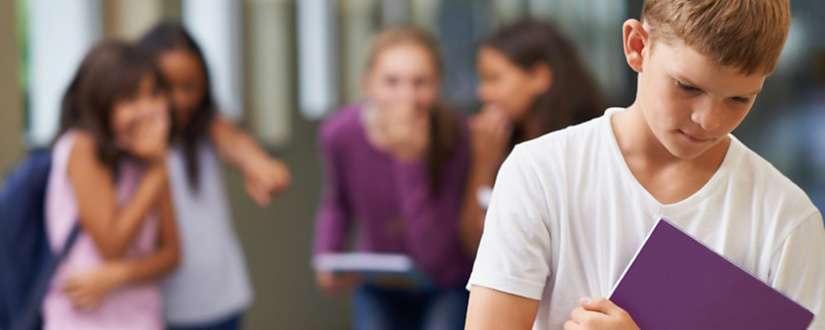"I don't want to go to school." That might be the normal response from some bleary-eyed students when their moms try to gently nudge them up in the morning. Usually, as Mr. Sandman runs out of time, the awakened student is excited to head to elementary school for another day. Not so much for students who are the prey of bullies. Fear of going to school is one of many symptoms that your child may feel intimidated by another student.
"Every day she would come home crying, and it was making me cry," Julie Cook said about her fourth-grade daughter. "He would tell her 'you're ugly' or 'you're stupid' just to aggravate or tease. It got to the point where she just couldn't take it anymore."
Close to half of all children will deal with school bullying at some point in primary or secondary school, according to the American Academy of Child and Adolescent Psychiatry (bullyingstatistics.org). At least 10 percent of children are bullied regularly.
Other signs of bullying to look for include:
Lower grades
Becoming withdrawn
Depression
Broken self-image
Bruises, scrapes, and other marks from possible physical altercations
Hey, Four Eyes!
As a school counselor, I teach guidance classes on bullying prevention. Think of bullying like the old-fashioned seesaw on playgrounds. If two equally-sized kids sit on each end, the seesaw will teeter in balance. If one kid is bigger than the other, look what happens to the child at the other end. His plank flies up high, while the other kid bottoms out. This example represents relationships. Ideally, two people will be even-keeled. In a bullying relationship, one child has power over the other. It is that domination toward someone perceived as weaker that makes it bullying.
This is part of the reason bullying is harmful. It can teach children a skewed view of what a normal relationship is. Also, bullying can damage a child's self-image, which can affect him through life. Schoolwork and friendships with other kids suffer, and in extreme cases, serious depression and suicide can result.
Bullying at school falls into one of three categories. First, there's the physical, where pushing, punching, kicking, shoving, and other forms of hands-on intimidation take place, usually with boys. Secondly, there's the emotional, like name-calling and teasing. Thirdly, students, especially girls, taunt others through social means, like gossiping and ostracism ("You can't be my friend if you're her friend.").
He Starts It; You Finish It
What would you do if a student were bullying you? Often my students respond with a statement like, "I'd ________ him." Fill in the blank with hit, kick, punch, etc. If a student feels like he can truly retaliate with no fear, I tell him he is probably not being bullied. Normally, a victim would want to steer clear of his antagonist. On occasion, a student chimes in that his mom or dad said, "If someone starts something, you finish it." Fighting isn't condoned at school, nor should it be at home. At the same time, as the father of a 9-year-old son, I don't expect Gavin to be another boy's punching bag. So, what can you do to help?
By reading Teresa Bateman's book, The Bully Blockers Club (Albert Whitman Prairie Books), I discuss with students how Lotty Raccoon attempts to handle her nemesis, Grant Grizzly. Here are some strategies.
Ignore/Avoid: Bullies want attention. Don't give it to them.
Be a friend: Sometimes bullies don't know the right way to be a friend. Try winning them over with kindness.
Don't be a pushover: In a clear, firm voice, look your intimidator in the eye and tell him to leave you alone.
Tell an adult: Let the adult in charge of the area where the bullying occurs know what's going on.
Build a club: Combine forces with other friends. The bully is less likely to pick on children who are in a group.
If these tips to empower your child to handle her troubles don't work, then you may want to step in. "Your child's only advocate is you," Cook said. "If you don't push for her, no one else is. Not that they [school officials] don't care about your kid, but they have nine million other things to do, and if you're not the squeaky wheel, your child's not getting help."
My Child Is the Bully
Mt. Juliet, Tenn., parents Beth and Barry Pilkinton discovered their daughter, Bella, is the "enemy." "That's not surprising to me," her mom said. "She had told some girl that something was really ugly on her dress. She has a very strong personality." Pilkinton and the guidance counselor stepped in with an empathy lesson to help Bella understand what she was doing was wrong.
Here are some signs that your child might be a bully.
Shows aggression toward adults and children
Needs to dominate others and control situations
Positively views violence as a solution
Easily frustrated
Demonstrates little sympathy to others who are being bullied
Bullies need to learn why they behave the way they do and what changes they can make to show more acceptable behaviors. Whether your child is the bully or being bullied, talk to a child counselor or pediatrician to come up with a game plan. Let's turn schools into a peaceful, bully-free zone.
Resources for Ending Bullying
• The Bully Blockers Club by Teresa Bateman (Albert Whitman and Company)
This article is courtesy of ParentLife magazine.
